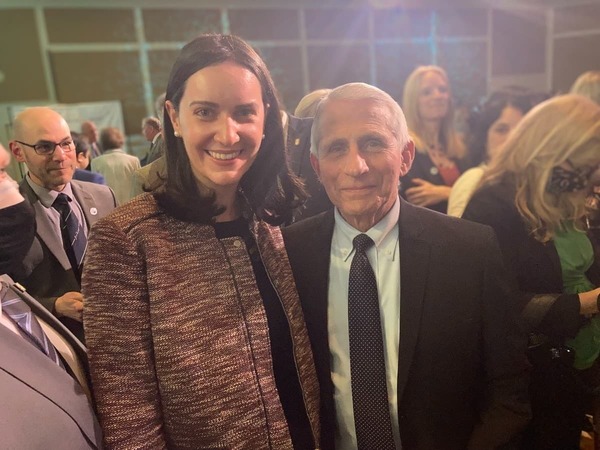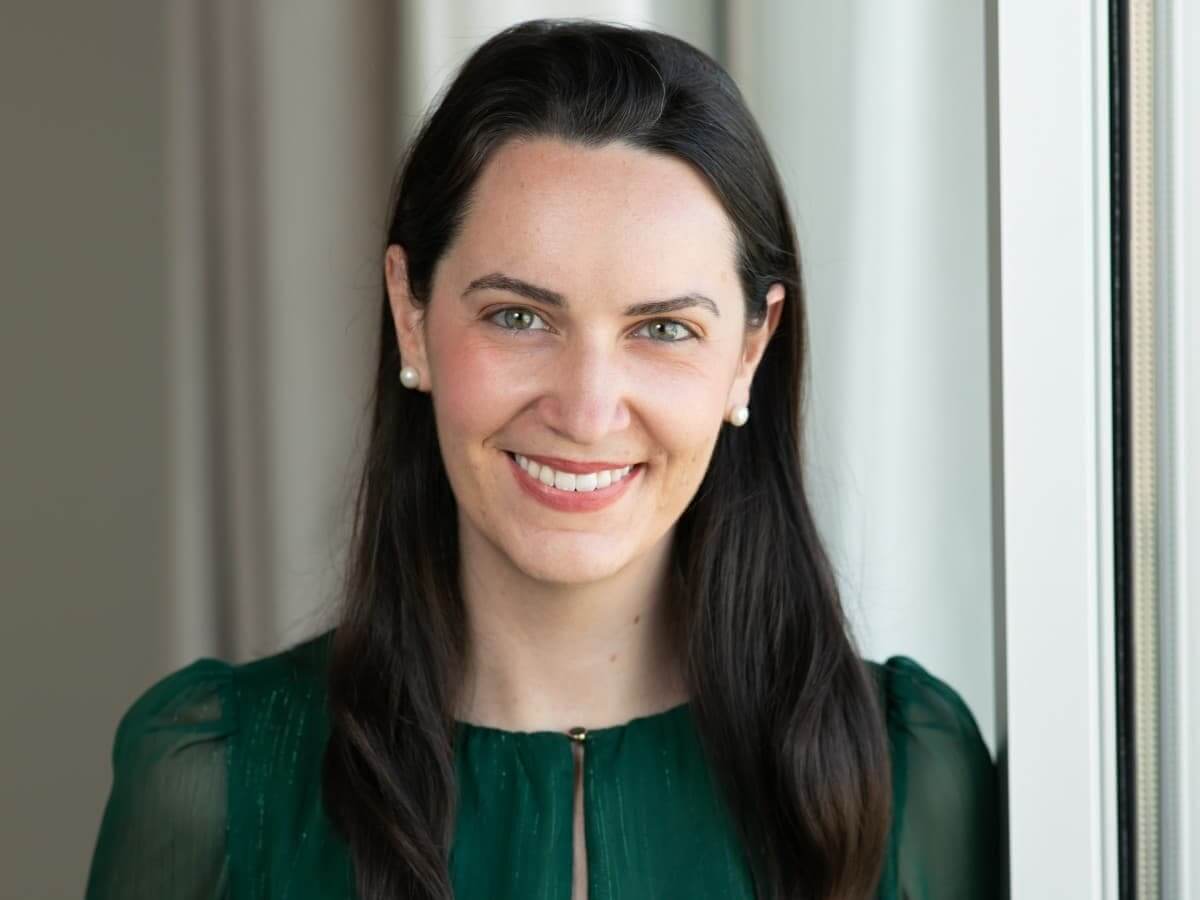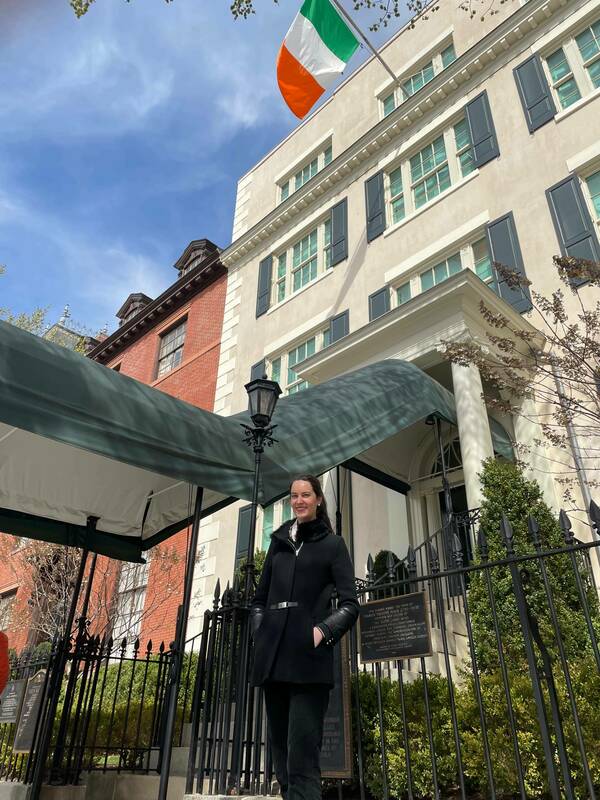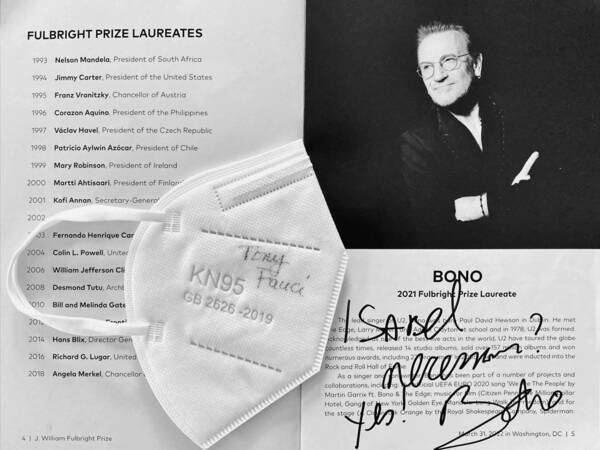

For Isabel Cabezas ‘17, art history is all about seeing connections that might not be obvious at first glance.
“I like uncovering things like that — where you wouldn't necessarily know a little secret or hidden nod that is in the painting, but that you can uncover through studying it or the mindset of the people at that time,” Cabezas said. “It's an art and a science in a way.”
Cabezas’ ability to make connections — both in art and in her career — has taken her to Ireland, a Fulbright Prize dinner table with Bono and Dr. Anthony Fauci, and an influential role in Europe’s electoral future.
Growing up in the multicultural city of Washington, D.C., as an international citizen with three passports, Cabezas has always been interested in museums, cultural heritage, and exchange through art.
She explored these passions through multiple academic angles while at Notre Dame, majoring in art history, minoring in anthropology, and taking some architecture classes as well. She was heavily involved with Notre Dame’s Snite Museum of Art as a member of its Student Advisory Group, working the front desk, and being a part of the student-led PhotoFutures committee that helped determine pieces of artwork the museum should acquire each year.
These experiences and interests shaped Cabezas’ future in art curation and education.“Historically, world leaders would study art history as a way for them to know the state of politics around the world and what different cultures are thinking, and I think that's still relevant,” she said. “Art is how we express, in a certain way, our beliefs and the cultural moment of the time.”
Art abroad through Irish internships
During a 2014 trip to Ireland, Cabezas and her mother went to O’Connell House, home of Notre Dame’s Dublin Global Gateway. There, they learned the Irish Internship Program offered a position at the National Gallery of Ireland.
That’s when Cabezas’ curiosity about the Irish program took off and led to an internship curating an exhibit at the Kylemore Abbey Global Center on Imogen Stuart, a German-born Irish sculptor and one of the most esteemed artists in Ireland.

“I'll never forget, Imogen called me a day before we were to meet for the first time and asked to reschedule because the president of Ireland had arranged to meet with her that day,’” Cabezas said.
During her time there, she helped create an exhibit which featured several of Stuart’s pieces from the past 30 years. Through the process, Cabezas utilized her art history and anthropological skills by making connections between history, biography, theology and unearthing meanings within art.
“I was ascertaining the influences on (Stuart’s) life, and then why she decided to portray a figure a certain way or another,” Cabezas said.
Then, through an introduction from mentor and Curator of Education Academic Programs at the Snite Museum Bridget Hoyt ‘03, Cabezas received an internship at the National Gallery of Ireland where she helped oversee public programming, artist workshops, and visitor tours.
Connecting art and diplomacy
After her Irish internships, Cabezas continued to make unique connections at home.
Through a coincidental Washington, D.C., art community connection, Cabezas connected with Jack Devine, who had just finished installing artwork at Notre Dame’s Washington Office of the Keough School of Global Affairs. She learned the office needed a coordinator for the new space and jumped at the opportunity as her interest in cultural diplomacy, as well as her passion for peace studies from an influential sophomore year pilgrimage to the Holy Land through Campus Ministry, made her a natural fit for the role.
“It seemed like the perfect way to complement my art history and anthropology background with a little more knowledge of the political scene,” Cabezas said. “And that is exactly what happened.”
At a Keough School event, Cabezas met David Donoghue, Ireland's former ambassador to the United Nations. Donoghue co-wrote the UN’s Sustainable Development Goals (SDGs), another of Cabezas’ key interests. The connection with Donoghue became an integral step in Cabezas’ career.
“I had told him that I was very interested in this crossroads of international cooperation and soft power,” she said.

Longing to go back to Ireland, Cabezas received a Fulbright U.S. Student Program grant to craft an educational program that engaged new audiences with the Hugh Lane Gallery in Dublin. She reconnected with Donoghue, and the conversation sparked an idea to tie the gallery’s collection to each of the UN’s sustainability goals, a curriculum known as SDG at HLG.
For example, Cabezas proposed to invite a local Irish marine ecologist into the gallery to discuss how 19th-century paintings of Dublin Bay contrast with the current state of the inlet. Cabezas hoped the discourse would shed light on the impact humans may have had on the bay over time.
Though the COVID-19 pandemic stifled the project, Cabezas found a way to link her passions together that has continued throughout her career.
“I think that's my biggest skill — connecting the dots and finding the ideas that might not seem like they obviously go together at first, but later can,” she said. “That is a skill that I've developed through art history.”
During the pandemic, Cabezas was then put in touch with Ireland's public broadcaster, Raidió Teilifís Éireann or RTÉ, to help with their 2020 U.S. presidential election night coverage by liaising with guest political commentators at the Hay Adams Hotel across from the White House.
Her continued experiences and desire to stay connected to the Emerald Isle ultimately led to a role at the Embassy of Ireland in Washington, D.C. As a Fulbright Award recipient and staff member at the Irish embassy, Cabezas was invited to attend the 2022 J. William Fulbright Prize ceremony and was seated with award honoree Bono, Fauci and his wife, and other important leaders.
"One woman had Bono sign her arm in Sharpie but, with an anthropological mindset, I know the value of material culture,” Cabezas said. “So I asked Dr. Fauci to sign my KN-95 mask."
Freedom for a diverse career path
Cabezas is currently a research assistant at the Irish embassy and handles various tasks from accounting to the art refurbishment program, in which she worked on projects such as commissioning a set of double portraits of Frederick Douglass with Daniel O’Connell and John Lewis with John Hume. She also assists in planning the annual St. Patrick’s Day visit of Ireland’s Taoiseach (prime minister).

In October, she will participate in a five-month long Schuman Traineeship at the European Parliament in Brussels, where she will work with celebrities as part of voter engagement strategies ahead of the 2024 parliamentary election. She is also obtaining a master’s degree in public relations from Georgetown University, where she learns more about how communications is a part of cultural work.
Through her continued experiences, Cabezas said she hopes to build even more connections around the power of art in cultural diplomacy, and knows that the liberal arts have prepared her with the skills to continue heading in unique directions.
“A lot of people asked me what I was going to do with an art history degree — and, at the time, I didn’t know what I was going to do because there isn’t a clear career path like there can be for other disciplines,” Cabezas said. “But six years out of college, art history has led me to living in an Irish castle, developing programs at a national art gallery, and hearing Bono tell Dr. Fauci about my Fulbright project. And, like other world leaders have in the past, studying paintings has led me to an opportunity to shape the political future.”
Originally published by at al.nd.edu on August 25, 2023.